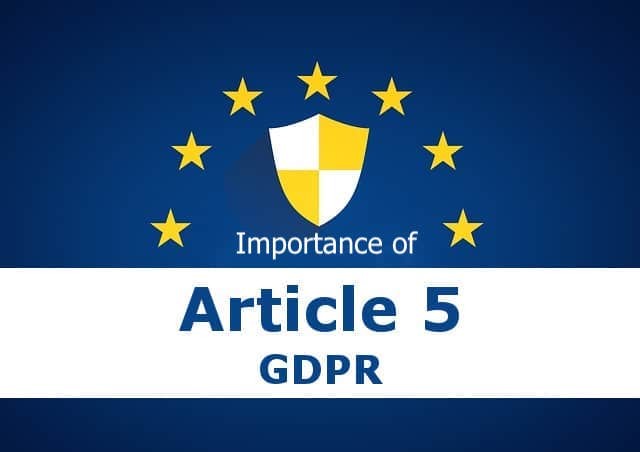The Importance of Article 5 of GDPR in Setting the Stage for Global Data Privacy Laws
Introduction
In the digital age, where vast amounts of personal data are generated, stored, and shared, protecting individuals' privacy has become a paramount concern. The General Data Protection Regulation (GDPR), implemented by the European Union (EU) in May 2018, revolutionized the way personal data is handled, emphasizing the significance of individuals' rights and empowering them with greater control over their data.
This article outlines the key principles of Article 5 and explores its global impact on shaping data protection laws.
1. The Fundamental Principles of Article 5
Article 5 of the GDPR establishes seven fundamental principles that organizations must adhere to when processing personal data. These principles form the bedrock of the regulation and lay the groundwork for robust data privacy laws globally.
- Lawfulness, fairness, and transparency: Organizations must process personal data lawfully and fairly. Example: A company collects customer data for a service but clearly communicates the processing activities and obtains explicit consent.
- Purpose limitation: Personal data should be collected for specific, explicit, and legitimate purposes. Example: An online retailer uses customer data solely for order processing and not for unrelated purposes.
- Data minimization: Only collect the minimum necessary personal data. Example: An educational institution avoids collecting unrelated medical or financial data from students.
- Accuracy: Keep personal data accurate and up-to-date. Example: Healthcare providers ensure patient records reflect current medical information.
- Storage limitation: Store data only as long as necessary. Example: E-commerce companies delete order data after a reasonable retention period.
- Integrity and confidentiality: Implement security measures to protect data. Example: Financial institutions encrypt sensitive customer information.
- Accountability: Organizations must demonstrate GDPR compliance. Example: Companies maintain detailed records of their data processing activities.
2. Global Impact and the Influence on Data Privacy Laws
Article 5 of the GDPR has had a profound impact on data privacy laws worldwide, sparking a global conversation on the importance of protecting personal information. Several countries and regions have adopted or updated data protection laws inspired by GDPR principles:
- California Consumer Privacy Act (CCPA): Grants California residents rights over their data, inspired by GDPR's principles.
- Brazil's LGPD: Establishes rules for data processing in Brazil, aligning with GDPR's emphasis on individual rights.
- Australia's Privacy Act Amendments: Introduces the Consumer Data Right (CDR), influenced by GDPR.
- Japan's APPI: Strengthens data protection with GDPR-like principles and breach notification requirements.
- South Africa's POPIA: Aligns with GDPR to enhance personal data protections and accountability measures.
Conclusion
Article 5 of the GDPR plays a pivotal role in setting the stage for global data privacy laws. Its principles emphasize transparency, purpose limitation, and individuals' rights, shaping robust data protection regulations worldwide. As the world becomes increasingly interconnected, Article 5 continues to influence privacy standards, fostering a culture of accountability and trust in the digital era.
Submitted By: Jaanvi Sharma (Intern 2022)
Guided by: Adv (Dr.) Prashant Mali ♛ [MSc(Comp Sci), LLM, Ph.D.]
For any queries about Data Privacy-related Consultation or Compliance for your organization, please email
privacy@cyberlawconsulting.com or visit our website at
https://www.cyberlawconsulting.com/dataprivacy.


